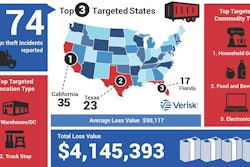A recent study that investigated major challenges for fleet managers highlighted issues like staying informed on Federal Motor Carrier Safety Administration regulations and ensuring employee safety.
The J.J. Keller Center for Market Insights surveyed 489 commercial and other fleet managers in February, focusing on trending concerns from 2021 to 2024.
 J.J. Keller Center for Market Insights
J.J. Keller Center for Market Insights
According to the fourth-annual study, fleet managers concerned with complying with hours-of-service (HOS) limits and use exemptions rose 13% from 2023 to 2024, whilst understanding how the FMCSA regulations specifically apply to them increased 9% year-over-year.

What do drivers want? Find out in this webinar.
What do truck drivers want? That's the million dollar question; a code that only a few carriers have managed to crack consistently.
In partnership with Lytx, CCJ this spring surveyed its company driver and leased owner operator audiences to find out what makes them tick (and what ticks them off).
Join us for a live webinar Aug. 1 at 1 p.m. CT and hear from two successful fleets – Garner Trucking (a perennial CarriersEdge Best Fleet to Drive For) and Crawford Trucking (a new carrier to crack the Best Fleets list) – as we discuss how they balance the wants and needs of new and existing drivers within their operations. Joining the discussion will be Elroy Whyte, himself a professional driver.
Finding and retaining high-quality drivers continued to be a top challenge from previous years, growing 12% from 2023.
“Despite widespread use of electronic logs, hours-of-service compliance remains a key concern, with HOS violations making up over 40% of all roadside violations and nearly one in five violations found during audits in 2023,” said Daren Hansen, senior industry advisor at J.J. Keller & Associates Inc. “Toss in a variety of exceptions, and it’s no wonder that drivers struggle with HOS compliance.”
For two consecutive years, the most important aspects of FMCSA compliance remain the same, analysts noted. Forty-seven percent (47%) of fleet managers – up 5% from 2023 – stated that having accurate and well-organized driver files was the key to FMCSA compliance. This was followed by 39% who said that staying up to date on regulatory changes is critical.
Hansen pointed out that compliance is only half the battle.
“You must systematically keep documentation that shows that you comply. It’s the one way you prove to enforcement officials, auditors, insurance companies and attorneys that you follow the rules," he said.
Analysts noted that it’s not a surprise that fleet professionals rank compliance with the HOS limits as a rising issue. According to another J.J. Keller report, fatigued operation and HOS violations by commercial motor vehicle drivers were cited over 460,000 times in 2023.
 J.J. Keller Center for Market Insights
J.J. Keller Center for Market Insights
When it comes to driving, respondents believe it’s important that their training is specific to the unique needs of their drivers, operations, vehicles or industry and that drivers apply what they learn in training.
There’s also a 12% year-over-year increase on the rising concern that training should be delivered as efficiently as possible so drivers can get back on the road.
Data indicated a keenness for additional training. Sixty-five percent (65%) of those surveyed agree that continuous learning is mostly or completely prioritized by their company, with 68% having in-person instructors, 47% online and 32% informally as needed. However, 35% felt that their company supported continuous learning somewhere between “somewhat” to “not at all.”
On safety, the most important aspect that fleet managers want to see is leadership consistently showing that safety is important (51%), followed by employees knowing that they are valued and fleet managers want them to be safe (46%).
The most challenging aspects of a fleet manager’s job, according to open-ended comments, revolved around finding and retaining high-quality drivers, staying up to date on regulatory changes, and paperwork and record-keeping.
”If you want to be a manager in this industry, either in safety or operations, be prepared,” said Tom Bray, senior industry advisor at J. J. Keller & Associates Inc.
More than half (74%) of fleet managers surveyed stated their job was moderately to extremely challenging.
"On the other end, just 27% said their job was only slightly challenging or not challenging at all," Bray pointed out. "It reminds me of the old firefighter saying, ’Everyone wants to be the chief until you have to do chief things. Then the job gets hard.‘ Having good people around you and leaning on outside resources can make the job much easier.”













